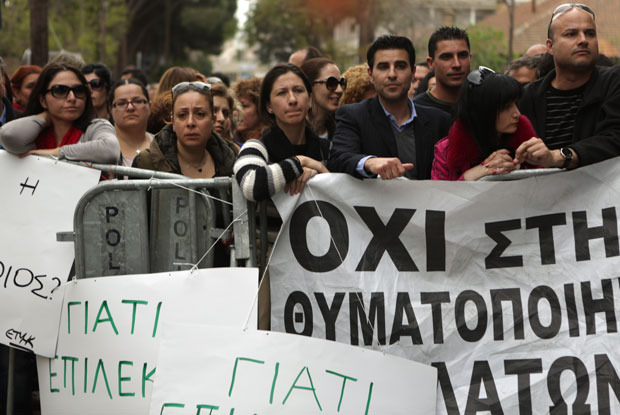The short answer: yes.

The European Central Bank and Cyprus are locked in a standoff that will reach a head Monday morning.
That’s the deadline the ECB has given the Mediterranean island to come up with 5.8 billion euros in order to receive another 11 billion from its European partner countries.
The cash is sorely needed by Cypriot banks which find themselves broke, in no small part because of debt they held that was issued by Greece, which is also broke (and therefore cannot pay Cyprus’ banks).
The government’s plan is to skim a slice from every bank depositor’s account to get the sum. Naturally, outraged savers are in the streets.
The calamity has sent financial markets whipsawing as investors can’t make up their minds over whether this is a big deal (could a bank run across Europe be triggered?) or not. It also casts fresh uncertainty about the EU’s ability keep its union intact.
But enough about that – most Canadians are simply asking whether the same thing could happen here.
First, the bad news: “In an absolutely dire situation, are there checks in place to prevent this from happening in Canada, I’m not aware that there is,” Paul Taylor, the chief investment officer for Canadian equities at BMO Asset Management told Global News.
- Posters promoting ‘Steal From Loblaws Day’ are circulating. How did we get here?
- Canadian food banks are on the brink: ‘This is not a sustainable situation’
- Is home ownership only for the rich now? 80% say yes in new poll
- Investing tax refunds is low priority for Canadians amid high cost of living: poll
But he added in the same breath, “The situation is so fundamentally different that bank depositors in Canada should sleep well at night – and of course we do have deposit insurance.”
Created in 1967, the Canada Deposit Insurance Corp. is a Crown entity that backstops savings for individuals for up to $100,000 in the event their bank goes bust. The insurance is automatic and covers the majority of deposits made with CDIC-member financial institutions, which is to say all big domestically-based banks and the majority of credit unions.
Foreign banks operating in Canada are not insured, while credit unions in Quebec and New Brunswick are founded on provincial charters and are backed by each province’s own insurance body.
Does the CDIC really have enough money to insure all deposits?
No, not even close. In total, the CDIC backstops about $600 billion worth of savings. Its cash position last year according to its annual report was $2.44-billion – or less than 0.5 per cent of insured deposits.
The CDIC was created to deal with individual bank failures, not a collapse of the sector. In the event of an emergency, it also has the power to borrow from the government or capital markets.
The situation in Cyprus however isn’t about wiping out Cypriot savings (yet, anyway), but nibbling off a portion from all accounts, which would let the country’s banks pay those who own their debts and stabilize the sector. The state has also pledged to backstop savings up to a certain amount in the event of bank failures.
In Canada, the fiscal positions of our governments and the financial sector – as we hear so often these days – are the envy of the world. The banks are well capitalized while Ottawa is now balancing the books following a period of stimulus spending to prop up the economy through the downturn.
“At that time we will stabilize the federal debt as a percentage of GDP as somewhere around 30 per cent and that is the envy of the G7, the G20 – there’s no suggestion that we’re in anything but an enviable situation.”
While stock markets are topsy-turvy about the latest European crisis, they’re not plummeting, either. Nor are depositors in other EU countries swarming their local banks demanding their money.
“There is the strong sense that there will be a solution to this short-term crisis. By Monday or Tuesday next week it will need to be addressed,” Taylor says.
He added in the same breath, however, “But one of the most telling pictures was protestors in Cyprus with placards that said in Spanish and Italian ‘Careful, you may be next.’”


Comments